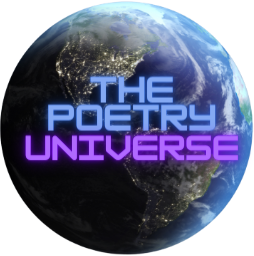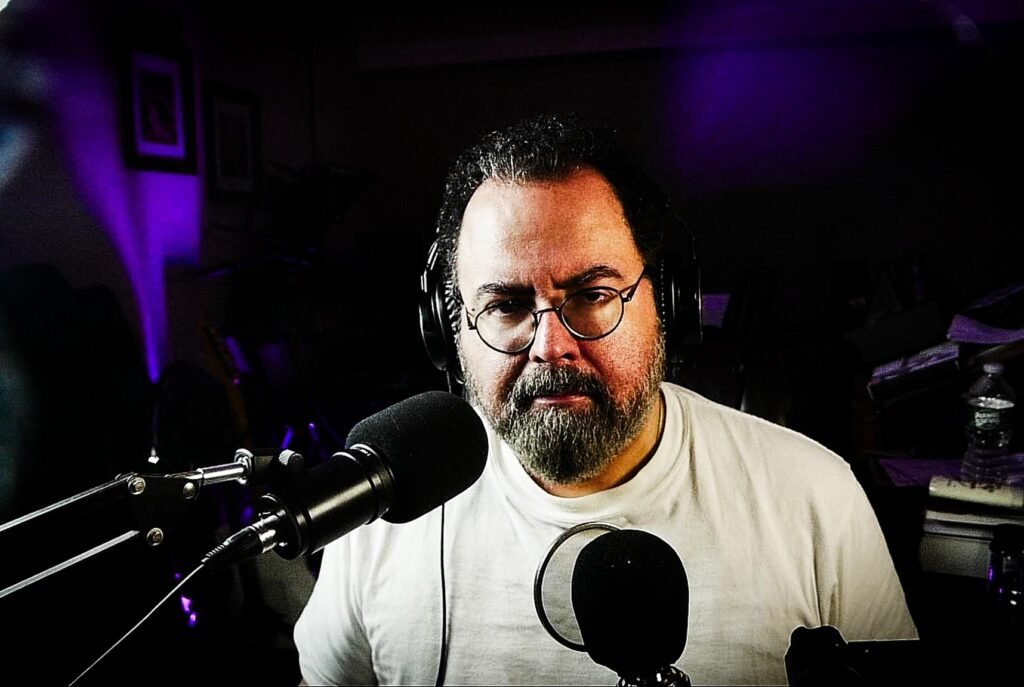I may be able to help you.
I am Gil Rosado. A couple of years ago, I wrote mostly narrative poetry as well as music but I had never thought about combining them until the era of Covid. The coronavirus was a game changer for many musicians in that it forced us into isolation and it made us “draw with a more limited artistic palette”. Well “necessity is the mother of creation” is indeed a cliché but it is also often true.
During the pandemic years, I had to rethink my writing, music and artistic platform. I learned quite a bit about audio-visual recording and editing software, hardware, along with filmmaking and animation technologies. I realized that poets in particular, can do a lot more in this social media-driven age than most think. With the ripe but shorter attention spans of people with smartphones and their media-saturated minds, poetry, when accompanied by images and music can create a new form of media that is consumable by the masses already exhausted by the often silly videos put out by the millions.
The current medium of audio-visual artistic works which include YouTube videos, animations, and visual poems is an untapped artistic haven and treasure-trove for writers, musicians and artists and yet it is not being fully utilized by many who are resistant to technology or those who simply have not found a roadmap for it.
So my message to all poets and fiction writers is this. We have to adapt, adapt, adapt! We have to embrace the technology, not shun it. Creative writing is no longer limited to the domain of books.
Obviously, as writers, books are where we typically dwell and draw from to create our voices, characters and creations. However, unless our quest is to write solely for ourselves, we must consider the reading habits of the current population. As writers, we need to ask “How many of the adults who can read, actually do so voluntarily?”.
The stats are mixed on this question and the data may not be accurate if retrieved solely from questionnaires but most stats agree that 23% to 40% of literate adults seldom read books on a regular basis. According to a recent research, approximately 23% of adults only confirmed reading one book per year (1). Yet, we can speculate that this really doesn’t seem likely and may indicate some false questionnaire responses within these stats. Readers tend to read more than one book per year. The ones who don’t are just referred to as “non-readers”.
The dilemma of adults with illiteracy or those with “low literacy” is well-documented in research but what is usually not mentioned are the non-reading adults.
Well…how did we get here? Why are non-readers rejecting books in favor of social media?
Let’s first consider the development of radio and television media during the first three-quarters of the 20th century that lead us into the abyss of social media. During the 1930s and later in the 1950s, the world welcomed both radio and television which included many radio and television shows which made some writers transform into scriptwriters and screenwriters. However, up until the internet age in the late 1990s, the prospect of any writer creating, editing and producing their own short works was unheard of due to the primitive technologies of those past eras and so books still remained a low-cost method of storytelling where traditional writers still maintained a large literary footprint. Thus, where you have traditional writers still on the scene, you will have readers.
However, much of this changed with the increasing evolution of the internet and gaming technology where a sizable portion of creative writing scripts created a new, sub-genre that required writers. In this global gaming phenomenon, “game story/scripts” are now somewhat akin to computer code as these stories are integral to the gaming functionality. Many of today’s gaming, particularly the ones of the sci-fi / fantasy genre involve rather elaborate characters and storylines with multiple quests, battles, recaps and outcomes based on algorithms fed off of user actions.
What does it mean for creative writers? It means that for poetry and short fiction writers especially, social media and gaming for that matter, is simply the evolutionary artistic step forward.
So how does a writer transform into a social media, webfilm, visual poem, and/or animation-based (i.e., gaming) artistic pioneer?
If you elect to go “all in” on this journey, you first have some questions to ask yourself and some decisions to make.
What are these new genres really? What are their characteristics?
| 1. Short Web Films – a narrative fiction story told in a video and audio lasting from 2 – 20 mins. This genre obviously suits the flash fiction and short story writer like a glove. |
| 2. Visual Poems – a story told with voice-overs in poetic language and multiple voices with integrated, audio-visual effects, music, images and animations. (Duration is from 2 to 20 minutes) |
| 3. Gaming Storytelling – This genre is akin to screenwriting as and it is typically more of a collaborative form of writing that works with and drives the “story” of the game under design. Games can be high-action, quests, fantasy, sci-fi inspired or a combination of all these writing ingredients. |
What skills are needed to dive into these new genres?
If you want to get involved with any of the above genres, you will need to evaluate your exiting skills and consider adding some complimentary skills such as filmmaking, film-editing and maybe learning some basic animation skills. If you’re a musician and/or composer, you already have a huge advantage over writers without such skills as your understanding of sound and telling stories with music may already be in your creative dossier.
What media will you get yourself into?
Expect to experiment and try different media which may include computer hardware and software, cameras, recording equipment and peripherals. It doesn’t necessarily have to break your budget however as many such equipment can be had at very low costs or even no costs in cases of open-source software (…more on this in future postings and videos).
Will you be a “solo act” or work as a creative collaborator?
The question of whether you can work with other creatives or on your own is a personal decision and it depends on your specific writing and your available resources. If you have a team of collaborators, you have some advantages and time may work more in your favor to produce more content.
If you are doing it on your own, you really only have 2 options (Short Films or Visual Poems) since you don’t have actors at your disposal and your longer fiction works simply won’t work in other formats unless you have others doing the dialogues and voice overs. However, the more people you need, the more you will likely need to pay them. This is not really a low-cost option however, this may work well in your favor if you are just establishing a social media identity and creating unique content.
If you want to learn more about how you can gain a foothold in the genres listed above, subscribe to my blog, YouTube channel and podcast using the links below as I will be providing more visual poem content, interviews and information to help you become a more eclectic and media-savvy writer.
| The Poetry Universe – Visual Poems |
|
The Poetry Universe Audio Podcast
|
Works Cited
“Who Doesn’t Read Books in America?” Pew Research Center, 21 Sept. 2021, https://www.pewresearch.org/short-reads/2021/09/21/who-doesnt-read-books-in-america/


